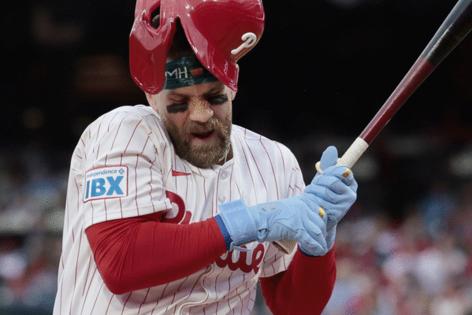Marcus Hayes: Phillies pitchers again failed to protect Bryce Harper after he got injured by a pitch
Published in Baseball
PHILADELPHIA — I’m not a fan of headhunting. I understand hitters are going to get hit by pitches.
But when your best player gets hit in the first inning of a three-game series and misses the rest of that game, at least the next three, and probably the next six, a message needs to be sent. It needs to be sent whether the pitcher meant to hit the batter or not. The message: If you pitch inside on our guys, and one gets away and nails one of them, then one of your guys is getting nailed, too.
Simple.
The Phillies failed to send that message.
Braves ace Spencer Strider hit Bryce Harper in the right elbow, which was surgically repaired in 2022. It was a 95.3-mph fastball. Harper was not diving over the plate, but he still had no chance to avoid it.
Harper collapsed, writhed about, and ultimately left the game. It was Strider’s fourth hit batsman in his three games since he returned from a hamstring injury. He’s a little wild, and that’s understandable.
Also, hitters with immense power, like Harper and Kyle Schwarber, see a lot of inside pitches.
They seem to come after Harper with abandon.
It’s infuriating.
It’s almost as infuriating as his teammates’ indifference.
Harper gets hit hard. Not once has a Phillies pitcher retaliated in his defense. He has no protection.
It is an issue.
He got hit in the face in 2021 by a 97-mph fastball from then-Cardinals reliever Génesis Cabrera and missed three games. Nothing.
He got hit on the left thumb in 2022 by a 97-mph fastball from Padres starter Blake Snell, broke a bone, had surgery, and missed two months. Nothing.
Now, Strider.
The Braves had to hit in 26 more innings. Not a single Brave got hit by a Phillies pitcher. Not even close.
Three more Phillies got hit during the series.
Come on, fellas.
Come on.
Be smart
You don’t even have to actually hit a guy. You just have to dust him off a little. Knock him down.
It doesn’t have to be the Braves’ best player. Just someone relatively important.
It doesn’t have to be ordered by the manager. The pitchers should take the initiative.
It doesn’t have to come from a significant pitcher. You don’t want to risk a suspension for a top starter like Zack Wheeler or a top reliever like Jordan Romano, but look at the Phillies’ bullpen. There’s lots of insignificance there.
I can understand strategic reluctance. Every baserunner matters in every game … almost.
The game in question was decided by two runs, the next game by one run.
However, Game 3 was a blowout by the Braves, and some pretty anonymous arms finished it for the Phillies.
The perfect moment was a long time coming, but sure enough, it came.
Opportunity lost
Brett de Geus has a 7.39 ERA in 61 major league games. He has a 4.61 ERA in 153 minor league games. He’s a 33rd-round pick, 1,000th overall in the 2017 draft, out of Cabrillo Community College, and the most recent of the 23 Seahawks drafted since 1968, a group that includes retired Blue Jays reliever Mark Eichhorn.
He’s played with 19 different teams, including two stints with the Triple-A Jacksonville Jumbo Shrimp, whose parent club, the Marlins, designated him for assignment on March 30, which allowed the Phillies to claim him two days later. He’s on a heater at Triple-A Lehigh Valley, with a 1.77 ERA in 14 relief appearances, and here’s hoping this year is his year, but, for the moment, de Geus is as fringey as major league players get.
The Phillies called him up as their 27th player for Thursday’s split doubleheader. He started the eighth inning, trailing, 8-0. He allowed a leadoff single, and, two outs later, that runner was on second base.
Up came Ronald Acuña Jr., four-time All Star, 2023 NL MVP, and the Braves’ best and most valuable player.
In other words, he’s the Braves’ Bryce Harper.
This was de Geus’ moment. A real chance for him to be relevant in baseball history, and, more importantly, become a Phillies legend.
He did not meet the moment.
He throws 96 mph. His first pitch should have been a 96-mph heat-seeker directed somewhere between Acuna’s left hip and left armpit. It was not.
Instead, de Geus threw Ball 1 to Acuna, about an inch outside. That was OK. Could’ve been a setup pitch. Sure enough, de Geus threw Ball 2, and he threw it high and inside, but not nearly inside enough.
He then threw a strike down the middle. Acuna flew out to right field.
Moment lost.
Sad situation
It might not be fair to target a career minor leaguer who finally seems on the brink of major league inclusion as the weapon of retaliation, but that’s where fate delivered him.
The Phillies face the Braves twice more this season, in late June, then in late August. Perhaps retribution will be served, but, unlike most revenge, this dish is not best served cold.
The message would not be received with the same clarity.
It’s unfortunate that de Geus turned out to be the most usable messenger. He wasn’t the only option. Just the best.
If nothing else, de Geus would have shown the rest of the big league staff how grown men take care of their own.
©2025 The Philadelphia Inquirer. Visit inquirer.com. Distributed by Tribune Content Agency, LLC.







Comments